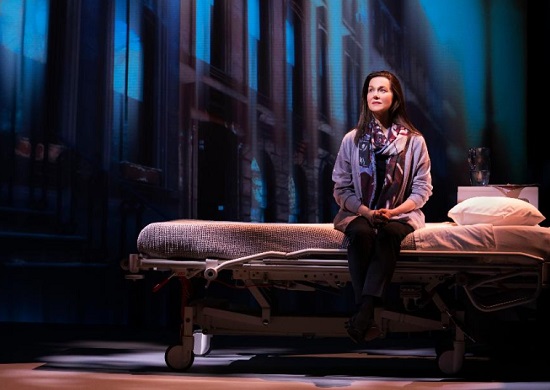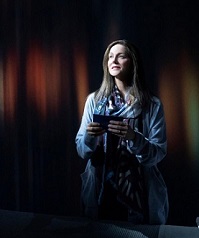My Name Is Lucy Barton

Tickets from $89 Buy Tickets

Cititour.com Review
The feeling of being alienated from one’s family – more precisely, feeling like an alien to the people who raised you – is universal enough that it helped propel Elizabeth Strout’s novel “My Name is Lucy Barton,” about a Midwestern-born woman who flees her poverty-stricken childhood home to find eventual success as a writer in New York City, onto the best-seller list in 2016. And I have little doubt many theatergoers will experience similar feelings of identification with the book’s titular heroine while watching its theatrical adaption of the same name, now at Manhattan Theatre Club’s Samuel J. Friedman Theatre under Richard Eyre’s direction.
But truth be told, I wasn’t one of them. Worse yet, I found the 90-minute work to be a supremely disappointing experience, rather than a worthwhile one. That’s primarily because Roma Munro’s idea to shape the book’s narrative into a multi-character monologue proves to be less-than-effective, even in the hands of the formidable Laura Linney, who frankly feels miscast in both of the play’s central roles.
Linney portrays both the 27-year-old Lucy –a still-naïve and emotionally scarred young woman battling the demons of her past – and her long-estranged mother, who surprisingly shows up in Lucy’s hospital room in Manhattan, where she is battling an inexplicable illness. The mother (whose first name isn’t revealed) clearly loves her daughter in her own way, but refuses to talk about anything of substance, instead filling the air with rather inane stories about people from Lucy’s hometown in Illinois. Moreover, when confronted with specific instances of Lucy’s childhood traumas, she downplays them or insists they never happened, and almost pointedly makes no mention of Lucy’s father (who is still alive and eventually is revealed to be the better parent). It’s no surprise they haven’t spoken in years.
Nonetheless, the scenes between the two women would probably be far more dramatically meaningful if the characters were played two separate actresses, rather than have Linney (who narrates the entire piece as the now middle-aged Lucy, oddly dressed in an outfit that seems to have come from the Chico’s clearance rack) jump back and forth between a hospital bed and a chair on Bob Crowley’s ultra-minimalist set (occasionally enlivened by Luke Halls’ projections).
More distressingly, Linney isn’t completely convincing in either role, mostly due to the natural intelligence that emanates from her every pore. I can believe there were plenty of Lucy Bartons in mid-1980s New York -- women who literally didn’t realize their chic European male neighbor was actually gay -- but it’s a lot harder to swallow from Linney. And one can’t help but feel that the exaggerated Midwest accent she uses when portraying Lucy’s mother is little more than a cover-up that Linney purposely employs to disguise the fact that the actress is just a bit too smart to play such an uneducated, unworldly woman.
In fact, the only moments where I completely believed Linney were at the play’s end, when Lucy speaks as the fiercely independent, successful writer who has made peace – more or less – with her past and her decision to escape it. In fact, I would have happily spent 90 minutes with that woman. Just name the time and place.
By Brian Scott Lipton
Visit the Site
https://lucybartonplay.com/
Cast
Laura Linney
Open/Close Dates
Opening 1/15/2020
Closing Open-ended
Theatre Info
Samuel J. Friedman Theatre
261 West 47th Street
New York, NY 10036
Map
Comments


 Sign up for our newsletter !
Sign up for our newsletter !